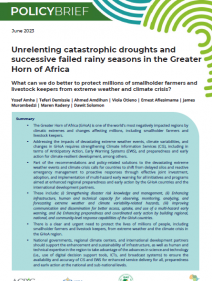The sixth Assessment Report of the Intergovernmental Panel on Climate Change (IPCC) confirms that the Greater Horn of Africa (GHoA) is one of the most adversely impacted regions on the planet by extreme weather events, climate variability, and change. Addressing the impacts of devastating extreme weather events, climate vulnerabilities, and changes in GHoA requires strengthening Climate Information Services (CIS), including in terms of Anticipatory Action, Early Warning Systems (EWS), and preparedness and early action for climate-resilient development, among others. Part of the recommendations and policy-related solutions to the devastating extreme weather events and climate crisis calls for countries to shift from delayed silos and reactive emergency management to proactive responses through effective joint investment, adoption, and implementation of multi-hazard early warning for all initiatives and programs aimed at enhanced regional preparedness and early action by the GHoA countries and the international development partners. These include: Strengthening disaster risk knowledge and management, Enhancing infrastructure, human and technical capacity for observing, monitoring, analyzing, and forecasting extreme weather and climate variability-related hazards, Improving communication and dissemination for better access, uptake, and use of a multi-hazard early warning, and (iv) Enhancing preparedness and coordinated early action by building regional, national, and community-level response capabilities of the GHoA countries.
Share this:
Release Date:
12 July, 2023
© United Nations Economic Commission for Africa

